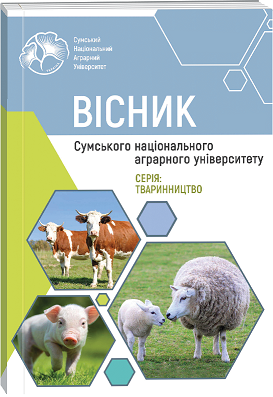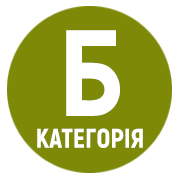PRODUCTIVITY OF BEE FAMILIES IN THE PERIOD OF PREPARATION FOR THE MAIN MEDICATION UNDER THE INFLUENCE OF A PROBIOTIC
Abstract
The purpose of the conducted research was to study the effect of the subtiform probiotic on the economic and beneficial indicators of bees. The research was conducted on bees of the Ukrainian steppe breed of a private apiary in the village of Volodymyrivka, Vinnytsia district. Bee families were kept in multi-body beehives, 10 combs in each body, with frame sizes of 435x145 mm. Bees in the control group were given pure sugar syrup, and in the experimental group, probiotic subtiform was added to the sugar syrup in doses of 0.5 mg/l, 1.5 mg/l, and 2.0 mg/l. Stimulating top-feeding in the spring period contributed to the intensive secretion of wax by bees, and the introduction of a probiotic supplement at the rate of 1.5 g/l of syrup had the greatest effect. The bees of this group rebuilt 37.9%, 8.1 and 9.0% more combs compared to the control, second and third groups. In the families of the third group, where the bees were given the probiotic subtiform at a dose of 1.5 g/l of sugar syrup as part of the stimulating feeding, compared to the control, second and fourth groups, 4.2 and 0.9% more closed brood was grown. No significant effect of the subtiform probiotic as part of the stimulating supplement on the mass of three- and six-day-old larvae and one-day-old bees was found. Only the third group had a slightly larger advantage of 2.7%, 1.5 and 2.4%, respectively. At the beginning of the main honey collection, the strength of bee colonies in the second group was higher than that of the control group by 9.1%, the third by 20.3%, and the fourth by 2.05%. Bees that were fed a probiotic supplement at a dose of 1.5 g/l of sugar syrup secreted wax more intensively, compared to the control group by 37.9%, the second and fourth groups by 8.1 and 9.0% more reconstructed honeycombs. Compared to the data of the control group, wax was produced by 34.3%, the third by 50%, and the fourth by 37.5%. The bees of the research groups collected more honey by 17.5–20.6%, the bees – by 25.9–66.6%. The most pronounced increase in economic and useful indicators of bees was found in the third group.
References
2. Borodin, Yu. M., Chornyy, M. V. (2013). Zhyttiezdatnist i produktyvnist bdzholynykh simei pry vykorystanni probiotyka «Baikal» EM-1U [Vital capacity and productivity of bee families when using probiotic «Baikal» EM-1U]. Problemy zooinzhenerii ta veterynarnoi medytsyny, 26(1), 85–92 (in Ukrainian).
3. Brovarskyi, V. D., Brindza, Yan, Otchenashko, V. V., 2017. Metodyka doslidnoi spravy u bdzhilnytstvi [Research methods in beekeeping]. Vydavnychyi dim «Vinnichenko» (in Ukrainian).
4. Halatiuk O. Ye., Tushak S. F., Lemeshynska L. F. (2017). Kilkisni zminy hemohramy bdzhil pry vykorystanni probiotyka «Enteronormin» [Quantitative changes in the hemogram of bees when using the probiotic «Enteronormin»]. Visnyk Zhytomyrskoho natsionalnoho ahroekolohichnoho universytetu. Seriia : Veterynarna medytsyna, 3, 2(63), 16–19 (in Ukrainian).
5. Gucol, A.V., Kovalskyi, Yu.V., Kovalska, L.M., Gucol, N.V. (2017). Vplyv probiotykiv na rist, rozvytok i hospodarskokorysni oznaky medonosnykh bdzhil [Effect of probiotics on growth, development and economically useful traits honeybees]. Naukovyi visnyk Lvivskoho natsionalnoho universytetu veterynarnoi medytsyny ta biotekhnolohii imeni S. Z. Gzhytskoho, 19, 74, 235–238 (in Ukrainian).
6. Dvylyuk, I. V. (2013). Perspektyvy zastosuvannia probiotykiv z metoiu profilaktyky zakhvoriuvanosti medonosnykh bdzhil [Opportunity to use of probiotics for preventive health of honeybees]. Naukovyi visnyk Lvivskoho natsionalnoho universytetu veterynarnoi medytsyny ta biotekhnolohii imeni S. Z. Gzhytskoho, 3(57), 15, 3, 321–326 (in Ukrainian).
7. Dmitruk, I. V., Suhovuha, S. M. (2017). Doslidzhennia vplyvu probiotychnykh preparativ na pokaznyky produktyvnosti bdzholynykh simei [Study of the effect of probiotic preparations on productivity indicators of bee colonies]. Ahrarna nauka ta kharchovi tekhnolohii, 5(99), 1, 30–37 (in Ukrainian).
8. Zabolotskaya, T. V., Shtaufen, A. V., Mironova, Ye. E. (2021). Primenenie probiotikov na osnove lactobacillus casei v pchelovodstve [The use of lactobacillus casei based probiotics in beekeeping]. Mezhdunarodnii nauchno-issledovatelskii zhurnal, 8(110), 2, 24–27. doi: 10.23670/IRJ.2021.110.8.040 (in Russian).
9. Lakhman, A. R., Galatiuk, O. Ye., Romanіshіna, T. O., Behas, V. L. (2021). Zminy morfolohichnoho skladu hemolimfy bdzhil ukrainskoi stepovoi porody pid chas zastosuvannia «EM® Probiotyka dlia bdzhil» u sadkovomu eksperymenti [Changes in the morphological composition of the haemolymph of Ukrainian steppe bees with the use of «EM® Probiotic for bees» in an entomological cage experiment]. Visnyk Sumskoho natsionalnoho ahrarnoho universytetu. Seriia «Veterynarna medytsyna», 3(54), 39–47. doi: https://doi.org/10.32845/bsnau.vet.2021.3.6 (in Ukrainian).
10. Mishukovskaya, G. S., Khristoforov, Yu. V. (2004). Vliyanie oksimetiluratsila, preparata mikrovitam, probiotika apinik na biokhimicheskie pokazateli organizma v ontogeneze pchel [Influence of oxymethyluracil, microvitam preparation, apinik probiotic on the biochemical parameters of the organism in the ontogenesis of bees]. Dostizheniya agrarnoi nauki – proizvodstvu, 91–96 (in Russian).
11. Nedashkivskiy, V. M. (2016). Vplyv hidrolizatu soievoho moloka na vyrobnytstvo bdzholynymy simiamy vosku ta homohenatu trutnevykh lychynok [Influence of hydrolysate of soya milk on the production of beeswax bee families and homogenate of drone larvae]. Tekhnolohiia vyrobnytstva i pererobky produktsii tvarynnytstva, 2(129), 78–81 (in Ukrainian).
12. Nedashkivskiy, V. M. (2017). Efektyvnist zastosuvannia u bdzhilnytstvi hliukozno-fruktoznoho syropu (HFS-42) [Efficiency of glucose-fructose syrup (HFS-42) application beekeeping]. Tekhnolohiia vyrobnytstva i pererobky produktsii tvarynnytstva, 1–2(134), 66–70 (in Ukrainian).
13. Nedashkivskiy, V. M., Nedashkivska, N. V. (2019). Vplyv pidhodivli bdzhil fermentatyvnym peptonom soievoho boroshna na vyrobnytstvo perhy [The effect of feeding bees with enzymatic peptone of soy flour on perga production]. Tvarynnytstvo Ukrainy, 3, 22–25. doi: 10.46913/beekeepingjournal.2021.7.05 (in Ukrainian).
14. Pshenichnaya, E. A. (2017). Vliyanie stimuliruyuschih dobavok na lYotnuyu aktivnost i medovuyu produktivnost pchelinyih semey [Influence of stimulating additives on flight activity and honey productivity of bee colonies]. Izvestiya Orenburgskogo gosudarstvennogo agrarnogo universiteta, 4(66), 193–195 (in Russian).
15. Razanova, O. P. (2019). Vykorystannia probiotyka bioseven dlia pidvyshchennia zhyttiezdatnosti bdzhil [Use of probiotic bioseven for increasing the viability of bees]. Ahrarna nauka ta kharchovi tekhnolohii, 2(105), 115–121 (in Ukrainian).
16. Razanova, O. P. (2021). Vliyanie stimuliruyushchei podkormki kompleksnimi preparatami na razvitie pchelinikh semei [Influence of stimulating feeding with complex preparations on the development of bee colonies]. Ştiinţa agricola, 1, 123–128. doi: 10.5281/zenodo.5090724
17. Razanova, O. P., Golubenko, T. L. (2018). Produktyvnist bdzholynykh simei za stymuliuiuchoi pidhodivli kompleksnymy preparatamy [Productivity of bjzoline families as a performance against complex preparations]. Ahrarna nauka ta kharchovi tekhnolohii, 4(103), 130–138 (in Ukrainian).
18. Tronina, A. S., Vorobieva, S. L., Judin, V. M. (2020). Vliyanie ispolzovaniya probioticheskikh podkormok na tempi rosta pchelinikh semei i ikh medovuyu produktivnost [Influence of the use of probiotic dressings on the growth rates of bee colonies and their honey productivity]. Izvestiya Orenburgskogo gosudarstvennogo agrarnogo universiteta, 6, 340–342 (in Russian).
19. Tushak, S. (2018). Kilkisni zminy hemohramy bdzhil pry zastosuvanni probiotyka «Enteronormin» [Quantitative changes in hemogram of bees using probiotic «Enteronormin»]. Naukovyi visnyk Lvivskoho natsionalnoho universytetu veterynarnoi medytsyny ta biotekhnolohii imeni S. Z. Gzhytskoho. Seriia : Veterynarni nauky, 20(83), 61–65. doi: 10.15421/nvlvet8312 (in Ukrainian).
20. Adamchuk, L. O., Boiarchuk, S. V., Lavrinenko, K. V., Dvykaliuk, R. M. & Martseniuk, N. I. (2019). Development of bee colonies based on early spring feeding according to the developed scheme. Animal science and food technology, 10, 2, 5–11. doi: 10.31548/animal2019.02.005
21. El Khoury, S., Rousseau, A., Lecoeur, A., Cheaib, B., Bouslama, S., Mercier, P. L. & Derome, N. (2018). Deleterious interaction between honeybees (Apis mellifera) and its microsporidian intracellular parasite Nosema ceranae was mitigated by administrating either endogenous or allochthonous gut microbiota strains. Frontiers in Ecology and Evolution, 6, 58. URL: https://doi.org/10.3389/fevo.2018.00058
22. Eshbah, H. M., Mohamed, A. A., Hassan, A. R., Mahmoud, M. & Shaban, M. M. (2018). Efficiency of feeding honey bee colonies, Apis mellifera L., with mixture of natural products and sugar syrup on brood and adult population. Scientia Agriculturae, 21, 14–18. doi: 10.15192/PSCP.SA.2018.21.1.1418
23. Gemeda, T. (2014). Testing the effect of dearth period supplementary feeding of honeybee (Apis mellifera) on brood development and honey production. International Journal of Advanced Research, 2, 319–324.
24. Hasan, A., Qazi, J. I., Muzaffer, N., Jabeen, S. & Hussain, A. (2022). Effect of organic acidsand probiotics on growth of Apis mellifera workers. Pakistan Journal of Zoology, 1–7. doi: 10.17582/journal.pjz/20210803100802
25. Kaznowski, A., Szymas, B., Jazdzinska, E., Kazimierczak, M., Paetz, H. & Mokracka, J. (2005). The effects of probiotic supplementation on the content of intestinal microflora and chemical composition of worker honey bees (Apis mellifera). Journal of Apicultural Research, 44, 1, 10–14. doi: 10.1080/00218839.2005.11101139
26. Mishukovskaya, G., Giniyatullin, M., Tuktarov, V., Khabirov, A., Khaziahmetov, F. & Naurazbaeva, A. (2020). Effect of Probiotic Feed Additives on Honeybee Colonies Overwintering. American Journal of Animal and Veterinary Sciences, 15(4), 284–290. doi: 10.3844/ajavsp.2020.284.290
27. Moustafa, A. M., Mohamed, A. A. & Khodairy, M. M. (2000). Effect of supplemental feeding at different periods on activity and buildup of honey bee cololnies. Assiut University Assiut, 71526, 385–403.
28. Oskay, D. (2021). Effects of diet composition on consumption, live body weight and life span of worker honey bees (Apis mellifera L.). Applied Ecology and Environmental Research, 19, 4421–4430. doi: 10.15666/aeer/1906_44214430
29. Patruica, S., Corcionivoschi, N., Julean, C., Călin, J. & Raducu, C. (2018). Influence of probiotic bacteria administrated to stimulate feeding of bee colonies during spring. International scientific symposium bioengineering of animal resources, international conference on life sciences, section bioengineering of animal resources.
30. Patruica, S., Dumitrescu, G., Popescu R. & Marioara Nicoleta, F. (2013). The effect of prebiotic and probiotic products used in feed to stimulate the bee colony (Apis mellifera) on intestines of working bees. Journal of Food, Agriculture & Environment, 11(3–4), 2461–2464.
31. Patruica, S., Dumitrescu, G., Stancu, A., Bura, M. & Dunea, I.B. (2012). The effect of prebiotic and probiotic feed supplementation on the wax glands of worker bees (Apis mellifera). Animal Science and Biotechnology, 45(2), 1–4.
32. Royan, M. (2019). Mechanisms of Probiotic Action in the Honeybee. Critica ReviewsTM in Eukaryotic Gene Expression, 29(2), 95–103. doi: 10.1615/CritRevEukaryotGeneExpr.2019025358
33. Schulz, M., Łos, A., Grzybek, M., Scibior, R. & Strachecka, A. (2019). Piperine as a new natural supplement with beneficial effects on the life-span and defence system of honeybees. Journal of Agricultural Science, 157, 140–149. DOI:10.1017/S0021859619000431
34. Shumkova, R. (2017). Effect on the chemical composition of the body of worker bees (Apis mellifera L.) fed with stimulating products. Macedonian Journal of Animal Science, 7, 129–135. doi:10.54865/mjas1771-2129sh
35. Topal, E., Mărgăoan, R., Bay, V., Takma, Ç.,Yücel, B.,Oskay, D., Düz, G., Acar, S. & Kösoğlu, M. (2022). The Effect of Supplementary Feeding with Different Pollens in Autumn on Colony Development under Natural Environment and In Vitro Lifespan of Honey Bees. Insects, 13, 588. doi: 10.3390/insects13070588
36. Topal, E., Yücel, B., Tunca, R.˙I. & Kösoglu, M. (2019). Effect of Feeding Honey Bees on Colony Dynamics. Journal of the institute of science and technology, 9, 2398–2408. doi: 10.21597/jist.532124
37. Ullah, A., Shahzad, M. F., Iqbal, J. & Baloch, M. S. (2021). Nutritional effects of supplementary diets on brood development, biological activities and honey production of Apis mellifera L. Saudi Journal of Biological Sciences, 28(12), 6861–6868. doi: 10.1016/j.sjbs.2021.07.067

 ISSN
ISSN  ISSN
ISSN 



